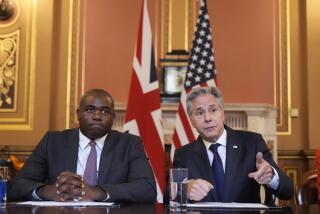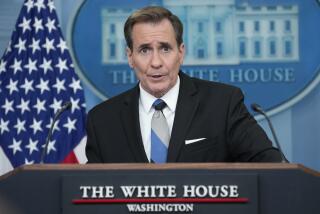U.S. decries Russia weapons sale to Syria
WASHINGTON — The Obama administration on Friday condemned Russia’s delivery of advanced antiship missiles to Syria and its buildup of warships in the eastern Mediterranean, arguing that the Kremlin’s escalating support for its longtime ally in Damascus could prolong the civil war.
Gen. Martin Dempsey, chairman of the Joint Chiefs of Staff, said Russia’s military moves would “embolden” Syrian President Bashar Assad’s forces and extend the suffering in the widening conflict. “So it’s ill-timed and very unfortunate,” he said.
The public rebuke marked a shift for the administration, which has sought to enlist Moscow in a joint effort to bring the warring parties to Geneva to negotiate an end to the fighting. Russia, which keeps its only overseas naval base in the Syrian port of Tartus, instead seems to have signaled its intention to back Assad’s government.
Syria’s acquisition of mobile batteries of Yakhont cruise missiles with advanced radar could make it more difficult if Washington and its allies decided to intervene in Syria and needed ships to impose a no-fly zone, to launch airstrikes or rescue missions, or to supply rebel forces by sea. Pentagon officials say U.S. forces could handle the threats, however.
Jennifer Psaki, a State Department spokeswoman, said Russia had disclosed the sale of the Yakhont missiles in 2011, and she added that U.S. and Russian diplomats were still planning the Geneva conference next month.
The White House also called on Russia to halt the planned delivery of sophisticated S-300 surface-to-air long-range missiles. Officials worry that Lebanon’s Hezbollah militants or extremist groups in the civil war could gain access to the antiaircraft missiles.
“We have consistently called on Russia to cut off the Assad regime’s supply of weapons, and in particular we point to air defense systems that are particularly destabilizing to the region,” said Bernadette Meehan, spokeswoman for the National Security Council at the White House.
Russian officials defended the weapons sales. They “don’t upset the balance of forces in the region and don’t create advantages in the struggle against the opposition,” Foreign Minister Sergei Lavrov said at a news conference Friday in the Black Sea resort of Sochi, where he met with United Nations Secretary-General Ban Ki-moon.
“We haven’t concealed that we have been supplying weapons to Syria based on signed contracts without violating any international treaties or Russian legislation, one of the strictest in the world in terms of export control,” Lavrov said.
Russian authorities resent international efforts to impose an arms embargo on Syria, said Samuel Charap, a Russia specialist at the International Institute for Strategic Studies in Washington. And Moscow believes that its armaments industry, a huge employer in Russia, has unfairly lost out in other sales, he added.
President Obama reaffirmed at a news conference Thursday that he had no interest in ordering military intervention in the Syrian war, which has killed at least 80,000 created more than 1.5 million refugees, according to the United Nations, and shows no sign of abating.
So the immediate effect of Moscow’s military maneuvers may be to leave the White House more vulnerable to critics’ charges that America is staying on the sidelines while Assad’s allies come to his aid.
Last month, the White House said U.S. intelligence agencies believed Syrian forces may have used poison gas against rebel forces. But Obama said more investigation, not U.S. intervention, was needed.
Since then, Assad’s forces have pushed back rebel forces in several key cities and regained control of key roads connecting Damascus with government-friendly areas closer to the coast.
At the same time, Russia appears to have grown more assertive. The RIA Novosti news agency reported Thursday that five warships, including a destroyer, from the Russian Pacific fleet had entered the Mediterranean through the Suez Canal for the first time since the Soviet era. By August, officials said, Russia is expected to have a dozen ships in the area.
Russia “is unlikely to take part in any hostilities on the side of Syria,” said Viktor Baranets, a former Defense Ministry spokesman in Moscow. But he said Russia “firmly intends to show its flag in the region.”
Andrew Kuchins, a Russia specialist at the Center for Strategic and International Studies in Washington, said Moscow was determined to prevent formation of an international coalition to oust Assad. Russia opposed the U.S.-backed coalition that helped rebels force Libyan leader Moammar Kadafi from power in 2011.
“The message is, ‘You’re not going to do in Syria what was done in Libya,’ ” Kuchins said.
Cloud and Richter reported from Washington and Loiko from Moscow. Staff writer Kathleen Hennessey in the Washington bureau contributed to this report.
More to Read
Sign up for Essential California
The most important California stories and recommendations in your inbox every morning.
You may occasionally receive promotional content from the Los Angeles Times.












